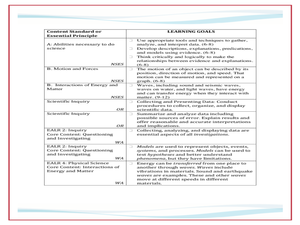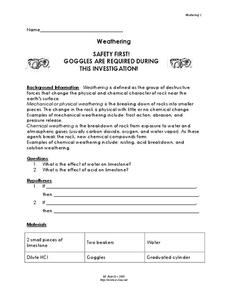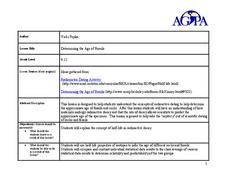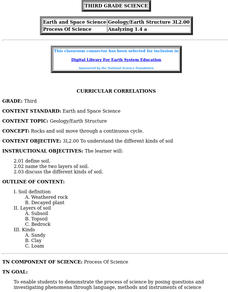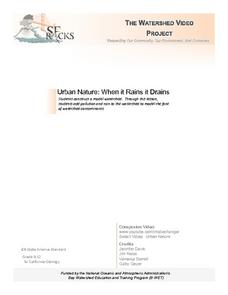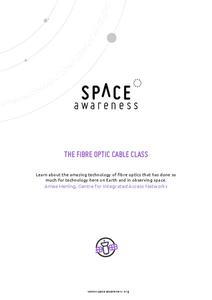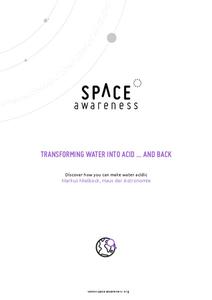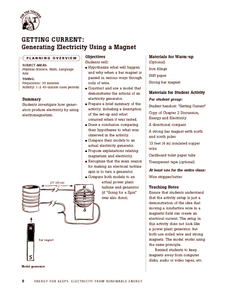Curated OER
Conditions at Sea Introductory Activity, Making Waves
Students explore waves and wind. In this physical and earth science wave instructional activity, students participate in a wave making activity with an aquarium and a hair dryer. Students complete a data chart recording wave height and...
Curated OER
Weathering
In this weathering worksheet, students investigate the effects of water and acid on limestone. They form a hypothesis for both and experiment to find the results.
Curated OER
Planets in a Bottle
Learners experiment with yeast. In this environmental conditions lesson students test the viability of samples of yeast. Learners investigate the effects of environmental conditions on the yeast.
Curated OER
Fossils and our Past (part 1 of 3)
Third graders investigate how some extinct organisms resemble organisms that are still alive today. They watch and discuss the Magic School Bus video about fossils, then create clay fossil imprints, matching the imprints to plaster of...
Curated OER
Predicting the Growth of Microorganisms
Students determine where microorganisms might be found around their school. In this scientific investigation lesson, students collect cultures from various locations and place these in petri dishes. They incubate the cultures to see if...
Curated OER
Trees and Erosion
Students examine the connection between trees and erosion. In this erosion lesson students experiment with the effects of rain on a hillside. Students investigate the number of trees and the amount of erosion.
Curated OER
Determining the Age of Fossils
Students examine the concept of radioactive dating. In this radioactive dating lesson plan, students investigate how to determine the ages of fossils and rocks as they learn about half-life radioactive decay.
Curated OER
What are Rocks and Minerals? How can they help us?
Sixth graders investigate the difference between rocks and minerals. They name the three kinds of rocks (sedimentary, igneous, and metamorphic) and know the differences between them.
Curated OER
Selecting Soil For a Sports Field
In this science worksheet, students take part in a laboratory exploration looking at different types of soil. The soil is evaluated in order to fill the role of becoming a sports field.
Curated OER
Introducing Biodiversity
Students investigate biodiversity by creating reports with their classmates. In this ecosystem lesson, students utilize the Internet to research the different types of life in our environment and different locations around the world....
Curated OER
Curricular Correlations
An interesting lesson on different types of soils is here for you. In it, learners discuss what soil is, and consider three piles of soil - clay, sand, and loam. During the rest of the lesson, third graders discover all sorts of...
Curated OER
When It Rains it Drains
Young scholars examine the major paths of water on the Earth's surface, and to investigate the many factors that contribute to those paths. Students demonstrate their understanding of a watershed by identifying the defining features of a...
Google
Plate Tectonics Questions
Investigating plate tectonics, boundaries, and the earth's physical attributes is the focus of this short answer, tectonic plates worksheet.
Curated OER
Volcanoes: Second Grade Lesson Plans and Activities
Young geologists explore volcanoes with a series of engaging geology activities. First, they learn the difference between magma and lava before coloring and labeling the parts of a volcano. During the lab, individuals watch a...
University of Colorado
The Moons of Jupiter
Can you name the three planets with rings in our solar system? Everyone knows Saturn, many know Uranus, but most people are surprised to learn that Jupiter also has a ring. The third in a series of six teaches pupils what is around...
Space Awareness
Navigation in the Ancient Mediterranean and Beyond
Ancient texts, like Homer's Odyssey, mentions navigating ships by observing constellations. Pupils learn about the link between history and astronomy as they relate to navigation in the Bronze Age. Scholars complete two hands-on...
Space Awareness
The Fibre Optic Cable Class
Many people know that fiber optics are used in delivering the Internet, but are surprised to learn they are also used in astronomy. Scholars explore light, reflection, and fiber optics through hands-on activities. They discuss methods of...
Messenger Education
Exploring Exploring
The reason people first began trading was because of their desires for objects other societies possessed. In the activity, classes discuss why exploration has been a common thread in all societies and where these desires have taken...
Space Awareness
Let's Break the Particles
Build learning by breaking atoms! Young scientists study the way energy changes with a hands-on activity. As they roll steel marbles down a ramp, learners test the hypothesis that kinetic energy does not go away with friction or...
Space Awareness
Transforming Water Into Acid ... And Back
Greenhouse gases affect marine wildlife in life-threatening ways. Through experimentation, your classes explore the acidification of water from the main greenhouse gas carbon dioxide. As they introduce carbon dioxide to water, a pH...
Energy for Keeps
Getting Current: Generating Electricity Using a Magnet
Give your class a magnetic charge with this creative experiment designed to teach emerging scientists about electromagnetism. Pupils construct a model that demonstrates the function of an electrical generator and test this creation in a...
LABScI
Atomic Structure and the Periodic Table of Elements: The Secret Agent Lab
Food always gets attention! Model atomic structure using fruit loops to represent the subatomic particles. After building models, scholars create ionic bonds using their models. Finally, they use these concepts to create a periodic table.
Curated OER
Exploring Seasonal Shadows and Sunlight
What can shadows tell us about the changing season? Over several months, astronomy learners record length and position of an outdoor object's shadow, such as a flagpole. They apply the data to a growing hypothesis and note the patterns...
Bowels Physics
Magnetic Fields and Forces
Every knows that opposites attract! Here's a presentation that uses this background knowledge to explain magnetic fields and forces. The resource also explains the shape of magnetic fields and how to determine the direction of forces.


